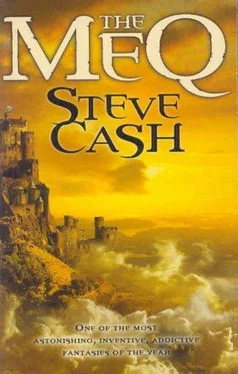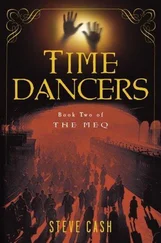Steve Cash - The Meq
Здесь есть возможность читать онлайн «Steve Cash - The Meq» весь текст электронной книги совершенно бесплатно (целиком полную версию без сокращений). В некоторых случаях можно слушать аудио, скачать через торрент в формате fb2 и присутствует краткое содержание. Год выпуска: 2005, Издательство: Del Rey, Жанр: Фэнтези, Детективная фантастика, ya, на английском языке. Описание произведения, (предисловие) а так же отзывы посетителей доступны на портале библиотеки ЛибКат.
- Название:The Meq
- Автор:
- Издательство:Del Rey
- Жанр:
- Год:2005
- ISBN:нет данных
- Рейтинг книги:4 / 5. Голосов: 1
-
Избранное:Добавить в избранное
- Отзывы:
-
Ваша оценка:
- 80
- 1
- 2
- 3
- 4
- 5
The Meq: краткое содержание, описание и аннотация
Предлагаем к чтению аннотацию, описание, краткое содержание или предисловие (зависит от того, что написал сам автор книги «The Meq»). Если вы не нашли необходимую информацию о книге — напишите в комментариях, мы постараемся отыскать её.
The Meq — читать онлайн бесплатно полную книгу (весь текст) целиком
Ниже представлен текст книги, разбитый по страницам. Система сохранения места последней прочитанной страницы, позволяет с удобством читать онлайн бесплатно книгу «The Meq», без необходимости каждый раз заново искать на чём Вы остановились. Поставьте закладку, и сможете в любой момент перейти на страницу, на которой закончили чтение.
Интервал:
Закладка:
We made our way to a boardinghouse Solomon was well acquainted with. The house seemed huge to me at the time, but really was only ten or twelve rooms. The landlady was Mrs. Bennings, an Irish woman with black hair pulled back in a bun, sky blue eyes, creamy white skin, and a figure Solomon described as “ripe as a great melon.” I never saw a Mr. Bennings, nor was he ever discussed, and courtesy was her strong point.
“Good evening, Mr. Birnbaum. And what might you be doin’ out on a night when all right-thinkin’ persons are safe and warm inside somewheres?”
Solomon shook the rain from his great black coat. I just stood there, dripping silently. He put his hands together as if in prayer and made a full bow from the waist.
“Please, call me Solomon, Mrs. Bennings. It is good to see your bright face again and on such a dark night as zis.”
“And yours too, sir. Will you be needin’ one room or two, seein’ how you sprouted a son since I seen you last?”
She glanced over at me and gave me a look that had more questions in it than anything else.
“No, Mrs. Bennings,” Solomon said, “zis is not my son. Zis is my. ” He paused and looked at her and she at him, ready for this latest explanation of himself. “Zis is my silent partner, Zianno Zezen.”
“Well, then, you’ll be needin’ two, won’t you, sir?”
“That is correct, Mrs. Bennings, that is correct. Partners need privacy. Zis is good business.”
“It is, it surely is, Mr. Birnbaum.” She was smiling to herself and turning to get room keys and towels. She stopped and looked at me.
“Do you ever speak, child?”
“Yes,” I said.
“Well, then, what do you say?”
“Very nice to meet you, Mrs. Bennings.”
She laughed out loud and sneaked a look back at Solomon. Her laugh stopped abruptly and she said, “Do you still have them stinkin’ mules and that damned old wagon, Solomon?”
He was already at the door, halfway out. “That I do, Mrs. Bennings, that I do,” he said.
“Well, then, put ’em where you usually do.”
He made another short bow and, with a wink, said, “That I will. That I will.”
We settled into our life at the boardinghouse. Every morning, we had breakfast with Mrs. Bennings and she made sure I always had enough to eat and was properly clothed. No one asked her to do these things. She just took it upon herself to do them. Some mornings I could smell whiskey still lingering on her breath, the same whiskey I smelled on Solomon’s. They spoke little in the mornings and I was quiet myself, so nothing was ever said about these things.
The rest of the day was spent in the busy streets of St. Louis. Solomon and I in the wagon, the mules in front, crisscrossing south side to north side, over to midtown, back to the river; all in pursuit of “business.” Some days, it was simple bartering; some days, gambling on fights, dice, cards, horses, baseball. The world turned and Solomon gambled. Some days we would just watch the river traffic, the coming and going of the big barges and pleasure boats. Solomon would say, “Zis is where the money will be, Z. On the water, you watch.”
He left me alone a lot, not out of negligence, but just because that’s the way it was for Solomon. Aloneness, not loneliness, was a natural and pleasant state for him. Many times while he was doing “business,” I wandered through St. Louis. I found our old neighborhood once and ended up playing baseball with a few kids I had known. I told them all that we had moved and never mentioned what had happened. I played with Mama’s glove and kept Papa’s baseball in my trouser pocket. I always kept it with me just like he told me. I tried not to think about Mama and Papa too much. I didn’t know how. Every time I thought of them, I thought of them as living and talking and laughing. I couldn’t think of them as dead. It didn’t make sense and what they told me didn’t make sense—“Find Umla-Meq. find Sailor. we are the Dreams.” It didn’t make sense, but their voices were still living within me and, somehow, I would do what they asked of me. I always had.
Solomon and I became best friends. He never tried to be a papa to me and I never tried to be a son. We were equals, silent partners. There were other children around, gangs of them, especially in the south side, but I preferred Solomon’s company. He told me stories and taught me to love books. He told me jokes most twelve-year-olds would never hear. He taught me simple mechanics and went on at great lengths about exotic religious rituals. He pointed out the different dialects and accents that we heard everywhere in St. Louis. He taught me all the games of chance and what to listen for when making a deal — any deal. And he never mentioned the train wreck or the curious way my arm had healed afterward, except once.
Fall had turned to winter and it hit hard. Off and on for six weeks, the whole south side was frozen in. A fever had spread street to street, house to house. Nearly everyone came down with it, including Solomon and Mrs. Bennings. I wasn’t sick yet, but I was worried that if I got sick we were in trouble, because there would be no one to do the chores and tend to the mules. Solomon called me to his bed and he said, “You will not get zis, Zianno. You will not get zis fever.”
I said, “What do you mean? How could I not?”
“No, no. Listen to me,” he said, “remember your arm?”
“Yes,” I said, but it was really more like remembering a dream.
“Well, listen to Solomon. Your kind does not get sick. Ever. The old rabbis knew. They knew. ”
Then he trailed off and went to sleep, but Solomon knew something. He knew something I didn’t. Later, when he got well, I tried to talk about what he had said, but he waved me off and seemed uncomfortable with it. He just said, “Zis is not good business, not now.”
I was different and I felt it, though I didn’t know why. Mama had said I was — we were — different and I felt more that way every day. Not just because I was Basque and didn’t look Italian or English or black or German or Chinese. And not because of my small size and quiet ways. My dreams had changed. They were deeper, richer, farther away. When I woke, I felt less in this world than another and sometimes this world became a dream. And I was alone. I felt alone with this difference.
Then I met the “Weatherman.”
It was March. A fierce, cold wind still blew out of Canada and was freezing the Midwest. In St. Louis, solid ice spread out a quarter of a mile from the riverbank into the Mississippi. All major trade virtually stopped. Solomon and I still made our rounds, but not as often. He hated the cold and so did his mules. And he hated missing his other “business,” his daily card games and gambling.
A friend of his told him of a poker game in which Solomon might be able to play mainly because he was German. It was held each day in the back room of one of the saloons favored by the new beer barons of St. Louis. In fact, the friend told him, Solomon looked quite a bit like one of the Lemp brothers, one of the players who would surely be there with lots of money in his pockets. But he would have to trim his beard, take off his little Jewish cap, and keep his opinions to a minimum. Solomon thought this to be a minor inconvenience in order to do “good business.” And with Mrs. Bennings’s help in the trimming and tailoring, he was physically transformed into a man he thought had the look and figure of a beer baron. He turned this way and that in front of the mirror, admiring the change.
“Not bad, eh, Mrs. Bennings?”
“Not bad at all, sir, but I’ve got to ask. What will you be playin’ with? Them fat old fellas got more in their pocket than you got on your whole person.”
He looked at her sharply, then back to the mirror. “I have enough to begin. After a few hands, zis will not be a problem.” He turned and looked to me as he was lighting a cigar. He said, “Zianno?”
Читать дальшеИнтервал:
Закладка:
Похожие книги на «The Meq»
Представляем Вашему вниманию похожие книги на «The Meq» списком для выбора. Мы отобрали схожую по названию и смыслу литературу в надежде предоставить читателям больше вариантов отыскать новые, интересные, ещё непрочитанные произведения.
Обсуждение, отзывы о книге «The Meq» и просто собственные мнения читателей. Оставьте ваши комментарии, напишите, что Вы думаете о произведении, его смысле или главных героях. Укажите что конкретно понравилось, а что нет, и почему Вы так считаете.












